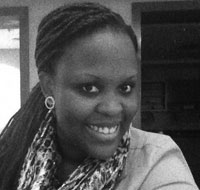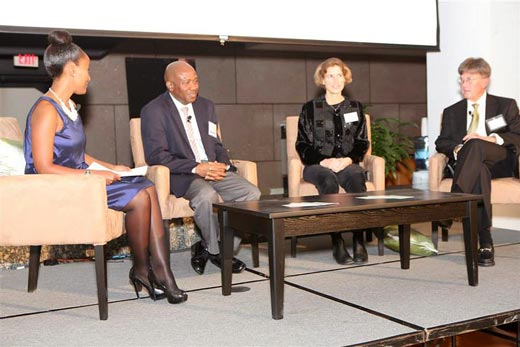Hello dear DUNIA readers! Happy 2015 to you all! I hope the year is off to a good start. We’re now in month 2 and Young Africans on the Move is fully in the swing of things. I promise this year to post regularly for my avid readers.
So I bet you are curious to know who will be featured on our first interview of the year. Well, I”ll try not to disappoint. This young woman won’t either. I am all things Twitter, if you don’t know this by now, you should. While I was making my list of potential interviewees for 2015, I came across a tweet that struck me from this young lady, so I started following her just to see what she was about. I found her tweets to be critical, highly intellectual and they made you think twice about what you posted. She asks tough questions, that some may consider controversial, while others not so much. One of my favorite tweets from this young lady was, “ I am the journalist that heads of state would run away from.”
So I invited her for a conversation on DUNIA. During the interview, I found her to be the true definition of raw and unfiltered (in a good way). Besides being a hardcore journalist, Miss NuNu is an advocate for Podoconiosis. Well if you’d like to know what this disease is, you will have to keep reading to find out.
So, meet NuNu Wako, an Ethiopian village girl/Pan-Africanist as she describes herself.
Name: NuNu Wako
Age: Under 30
Origin: Born in Nejo, Ethiopia
Educational background: International Relations, Communications and Broadcast Journalism
Professional background: Broadcast Journalist and Philanthropist; Pan-Africanist
1. What’s your story?
 My story is about being an exceptional Ethiopian village girl on the move to make a difference in the world. I am very passionate about Africa and our people’s welfare.
My story is about being an exceptional Ethiopian village girl on the move to make a difference in the world. I am very passionate about Africa and our people’s welfare.
I came to the United States at a very young age and quickly learned that everything was black or white. I just did not fit into either of those boxes.
I am Ethiopian, an African. I grew up in a household embracive of all human beings and race was never discussed with us as children. We were given the freedom to – just be. But in America’s reality, I needed to either be black or white. There were no in betweens.
As a child, I grew up witnessing KKK burning crosses, people dressed in white because they despised my mere existence. As a teenager, I was not considered black enough because of my skin complexion, the texture and length of my hair. Oh, yeah my accent, too.
In high school that is when things started to change. I became very passionate about Africa. It is at that stage that I embraced being African. Being different was OK. I realized that my classmates didn’t know or understand much about the African continent.
My passion in wanting to articulate Africa and project positive images of our continent the way that it really should be, stems from my experiences in High School. I started volunteering with African centered organizations to be closer to the community.
While pursuing my higher education, I got lucky, and was discovered by a modeling judge who at the time was scouting for girls to compete in a Nautica Jeans competition to be the face of Nautica overseas. As luck has it –I won the competition.
This has opened up so many doors for me as a model and has given me the platform to meet people that I, otherwise, would not have had the opportunity to meet. It is at this juncture that I decided that pursuing Journalism would be the most powerful platform to tell the African story and narrate it accurately.
3 words to describe yourself.
Daring. Realistic. Informed.
But… I am a RARE STAR!
What is your favorite thing about being Ethiopian?
My favorite thing about being Ethiopian is that I come from a nation that is defendant of not just its people and territory, but of Africa as a whole. It is central to the African history and home to civilization. Ethiopia is the pride of Africa and Africa is Ethiopia.
I did some research on you, and one thing that stuck out to me was your active work on helping end podoconiosis. Can you explain to us what that is and how you are involved?
I traveled to Ethiopia in 2010. During my travels to the countryside to visit relatives, I noticed swollen lower limbs in some people I encountered. Being aware of Elephantiasis, I was curious to learn about the root cause of this illness. Innately assuming it was Elephantiasis [which it wasn’t], I asked my family if they knew what it was. Being very educated, they gave me an answer that I was not expecting – saying it was some curse that people put on them [the afflicted] or maybe a hereditary disease. That response did not suffice for me, so when I returned to the US, I did what a journalist would do – research, research, research.
It was through my research that I came across Dr. Gail Davey’s assistant Sarah’s presentation for TOMS shoes. From her presentation, I was dumbfounded at how easily this disease can be treated and eradicated in our lifetime. The cure is very simple – it is in the simple hygiene of washing the feet, wearing shoes and socks. This inspired me even more to get involved.
My partnership with Footwork International (www.podo.org) commenced in late 2010. My first commitment to Dr. Gail Davey was to organize and host an awareness campaign with the help of the Embassy of Ethiopia in Washington, DC.
I did achieve that commitment by organizing an awareness/fundraiser event at the Embassy of Ethiopia. I was able to bring together the international community of Diplomatic Corps, academia, pharma, policy makers from U.S. Congress, grantors and health professionals under one roof to introduce them to Podoconiosis. We managed to pull that off as our first effort — [as part of the program], I moderated a panel discussion with Dr. Moses Bockarie – Director of the Centre for Neglected Tropical Diseases (LSTM), Dr. Gail Davey – Founder of Footwork Intl. & Dr. Mike MyCoskie – Father of Blake MyCoskie – Founder of TOMS Shoes. At this event was the very first time some of the people in attendance EVER heard of Podoconiosis and I am certain, this article is the first time some of the readers are learning of this disease that impacts millions of people in ten other African nations, India, Central and South America. Visit www.podo.org for more information.
Who would your most coveted interview be with as a journalist?
Nelson Mandela. Actually, I was two months shy of having this opportunity granted. I submitted my request and by the time it was reviewed, our late Madiba had made a decision not to take anymore requests for interviews by the media. I was heartbroken.
The sole purpose of my interview request was to ask one simple question: Why are so many African leaders failing to follow his exemplary vision of not only excelling in their positions as presidents but with integrity, lead their nations?
I will never get an answer. Madiba sacrificed what many take for granted: nearly one-third of his life [in prison]; not because he deserved it, but because he believed that his freedom was worth nothing if the masses could not experience the same freedoms. I am forever touched, empowered and inspired by him. We owe it to him and those before him to make Africa a better continent.
How did you get your first break in journalism?
As I previously mentioned, modeling opened many doors for me. One of the opportunities was meeting two other African ladies – one from Ghana, the other from Nigeria. We started a program titled Africa in Demand. It was a hit show. However, due to the differences in direction, I decided to separate myself.
I was in a stage of what can I do next to continue to work on the vision I have in which I saw myself being immersed in all things Africa? So, I pitched my idea to a TV station and with my background in modeling, they had suggested that I do a show on fashion. I immediately turned in down because I felt as if everyone had a show on fashion. I then approached an independent Ethiopian Television Network, pitched my idea and they loved it. My first season was a pilot and it did exceptionally well. NuNu Wako Show was on air for 6 years and it was being broadcasted everywhere – the continent being the target audience.
Last year, I took a break and got involved in other endeavors that have allowed me to expand my wings and brand a lot more broader; I will be in production for NuNu Wako Show soon. Don’t you worry Africa; I will be back bigger and better. I just needed a break from TV.
What does being a Pan-African mean to you?
People are terrified by these two words. Being a Pan-Africanist is having an unwavering stance about the continent of Africa. The good, the bad and the ugly. It is Africa. It is the passion of having a collective progressive vision for the continent that will make Africa become what we aspire for it to be.
Being a Pan-Africanist is being a part of that collective vision. We must, as Africans, understand that we’re only as powerful, stable, successful and as sustainable in all of our existence as our neighbors are. If you fail, that failure will trickle down to the next – one nation at a time. We are as strong as our weakest link.
What do the next 5 years look like for you professionally and personally?
Personally, I hope to be married to the love of my life and have children.
Professionally, I hope to play a role in having our African leaders embrace media and openly allow societies across Africa to utilize it to narrate the African stories ourselves. Media is a powerful platform that can help in the development of Africa and shift the paradigm and perception of the continent for the better. I hope that my work empowers and addresses many of the societal issues we are faced with in Africa. I hope within the next five years, my work is a part of the collective voices articulating the continent the way it should, not how it continues to be.
What advice do you have for our readers and young people?
To always find a source of inspiration to be empowered. Often times, we read something and miss the message being conveyed because some messages are subliminal. Take you time to receive and process information as to attain the message the author is trying to convey. Also, to believe in yourself first and always; if you do not believe in yourself, no one else will.
Rock on Africa –because you are the ROCK & STAR of this universe!
NUNU WAKO PHOTOS
Be a part of my life…
Twitter: @NuNuWako
Instagram: @NuNuWako
Website: www.nunuwako.com
 Samandu Tshimanga, who goes by Samy, is a college graduate from Indiana University South Bend with a Bachelors of Arts in Political Science and a minor in Sociology. She loves the study of people. She is a freelance analyst and talks about politics, human rights and whatever else floats her boat. Her column Young Africans On The Move with Samy showcases exceptional young people making a difference in the community and in their countries back in Africa. Originally from Kinshasa, Democratic Republic of Congo, Samy currently resides in Indianapolis. Twitter: @chic_cocobelle
Samandu Tshimanga, who goes by Samy, is a college graduate from Indiana University South Bend with a Bachelors of Arts in Political Science and a minor in Sociology. She loves the study of people. She is a freelance analyst and talks about politics, human rights and whatever else floats her boat. Her column Young Africans On The Move with Samy showcases exceptional young people making a difference in the community and in their countries back in Africa. Originally from Kinshasa, Democratic Republic of Congo, Samy currently resides in Indianapolis. Twitter: @chic_cocobelle


